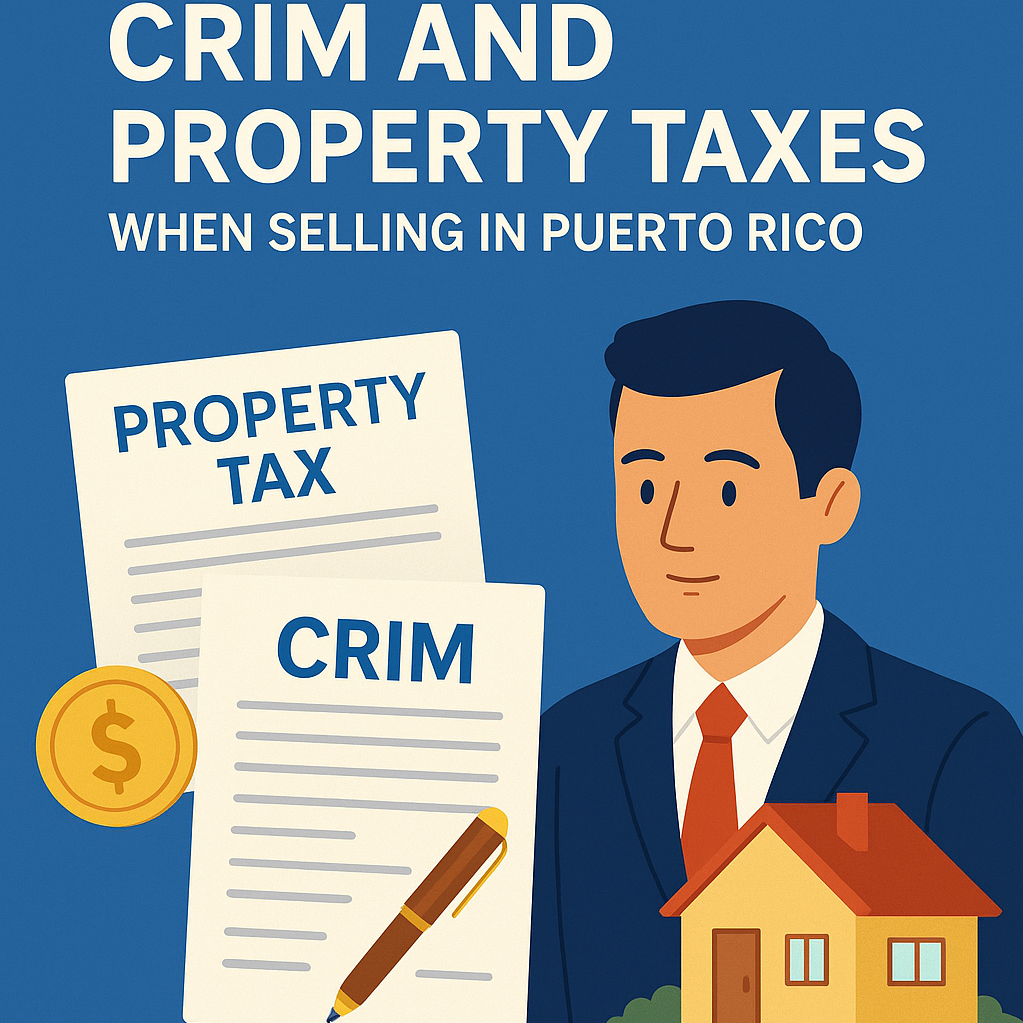
SEO Focus: CRIM Puerto Rico, real estate taxes PR
If you’re planning to sell a home or property in Puerto Rico, you’ve probably heard the word CRIM mentioned more than once. But what exactly is CRIM? And how does it affect your sale?
Whether you’re selling your primary residence, an investment property, or inherited land, understanding your tax obligations is key to a smooth and successful transaction. In this guide, we’ll break down how CRIM works, what property taxes you may owe when selling, and how Puerto Rico Real Estate, PSC helps you navigate it all with confidence.
CRIM stands for Centro de Recaudación de Ingresos Municipales, or the Municipal Revenue Collection Center. It is the government agency responsible for:
Assessing and collecting property taxes
Managing exemptions
Issuing property debt certifications
Providing the “Estado de Cuenta” (account statement) needed for real estate closings
If you own property in Puerto Rico, you're required to register it with CRIM and pay your annual property tax bill.
Before you can close on the sale of your property, CRIM must:
Confirm that your property tax account is up to date
Provide a zero-balance certification or proof of debt
Issue a property appraisal (tasación fiscal) if required
Certify any applicable exemptions or debts attached to the property
Your notary attorney will not proceed with closing unless these CRIM documents are in order.
Property taxes in Puerto Rico are calculated based on:
CRIM-assessed value — Not necessarily the market value
Tax rate — Usually around 8.03% of the assessed value
Applicable exemptions — Such as the “exoneración de hogar” (primary residence exemption)
Most homeowners pay CRIM bills semiannually, typically in January and July.
Unfortunately, many sellers are unaware of CRIM requirements until they’re weeks away from closing. Common issues include:
Unpaid property taxes
Unregistered improvements or additions
CRIM account under a deceased owner’s name
Incorrect or outdated property descriptions
Missed exemption renewals
CRIM debt being passed to the buyer
Delays caused by CRIM problems can easily postpone or cancel a closing.
We help our clients prepare for a successful sale from day one—including reviewing all CRIM-related documents.
✅ Verify your CRIM balance and request the official account statement
✅ Request the “Certificación de Deuda” or “Estado de Cuenta” in advance
✅ Coordinate with attorneys and notaries to ensure all tax paperwork is filed correctly
✅ Guide you through property tax payments if you have pending amounts
✅ Help you correct account names or descriptions to avoid title issues
✅ Advise on how exemptions impact your sale (especially if you’ll owe retroactive taxes)
Our goal is to avoid any surprises during closing—and to save you time, money, and stress.
If the property is still under a parent or grandparent’s name—or if you bought it cash years ago but never updated CRIM—there may be:
Back taxes due
Name or title discrepancies
Unregistered improvements that affect the tax value
In these cases, we’ll help guide you through the legal and administrative steps to bring everything current before listing the property.
Capital gains tax is separate from CRIM and handled through Puerto Rico’s Departamento de Hacienda (Treasury Department). However, it is still an important part of the transaction, especially if:
You’re selling an investment property
You’ve owned the home for a long time and the value has significantly appreciated
You are a non-resident seller
We work closely with accountants and legal professionals to guide you through any capital gains implications as part of your sale.
To ensure your transaction goes smoothly, you (or your notary) will need to obtain:
✅ “Certificación de Deuda” from CRIM
✅ Updated property tax receipts
✅ Tasación fiscal (if needed)
✅ Proof of exemption (if applied)
✅ CRIM registration under the correct owner name
✅ Verify property is registered in your name
✅ Check CRIM balance (zero owed)
✅ Review any exemptions or discounts
✅ Register any unrecorded improvements
✅ Gather your latest CRIM statements
✅ Share all tax documents with your agent and notary
Don’t let CRIM hold up your sale. At Puerto Rico Real Estate, PSC, we help you prepare your property legally, financially, and strategically—so you sell with confidence.
📱 Call or Text: 787.244.6364
📧 Email: [email protected]
🌐 Website: www.ThePuertoRicoRealEstate.com
#PuertoRicoRealEstate #CRIMPuertoRico #PropertyTaxesPR #SellYourHomePR #ClosingInPuertoRico #RealEstatePR #VendeTuCasaPR
Your satisfaction guides our every step. Thanks for choosing PRRE. View all.
"Thank you for your service great teamwork I completely appreciate your time and all your effort thanks again"
You were so much help. Thank you for staying on top of things with me.
The closing was straightforward and completed without incident. The buyers were wonderful. Thank you.
The closing was straightforward and completed without incident. The buyers were wonderful. Thank you
I received your listing in email and just wanted to thank you for the EXCELLENT information. You included not only the correct location, but good, quality video/photos, everything. It's not exactly what I need but: A rare thing to get such a quality listing information, just wanted to say thank you.
Everything went smooth and great at closing, you were such a great help in the process. I will refer you to a friend that needs your help. Thanks alot for all you did for me.
Thanks to all of you, super attention, you explained everything very kindly and the Lcda was also super kind. All excellent more than grateful for everything!!
Everything super good, they treated us very well and everything went well with the closing. Everyone was very nice and the Lcda was very kind to us. Thanks to you and your team who treated us very well and never let us go. I will recommend you and hope to call you soon to find a property.
Closing Done, only took an hour.No problems it went smooth. Thanks again for everything! Having a drink to celebrate.
Very Smooth Transaction. Your Team was very supportive and they helped me alot during the transaction.